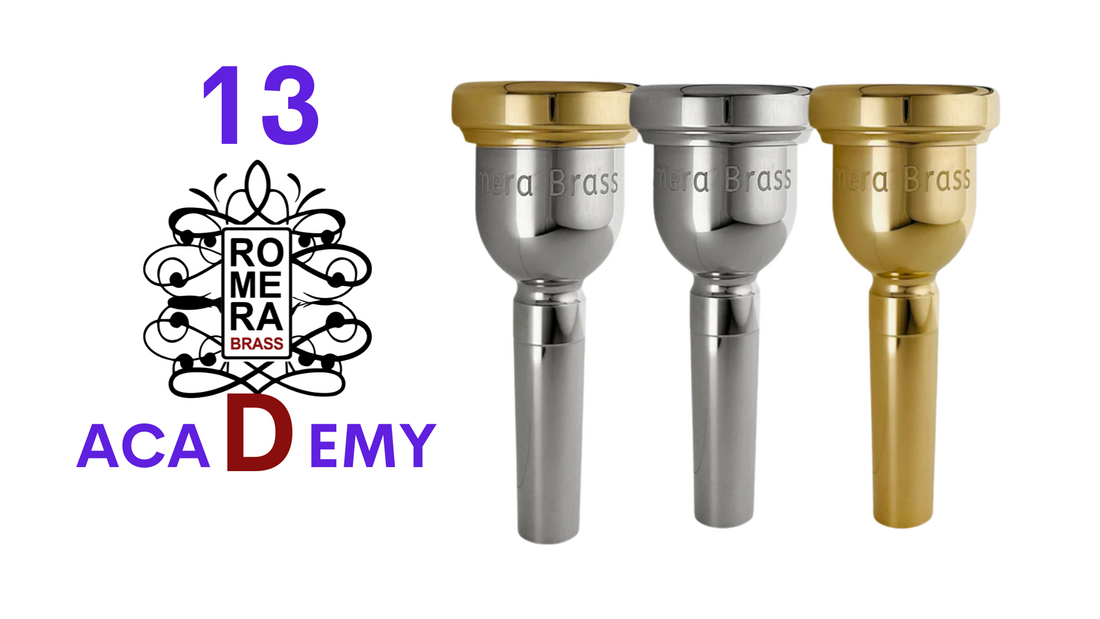
13. Which is better for the sound, a silver-plated mouthpiece or a gold-plated mouthpiece?
Share
Perhaps it is the question that I am asked the most, and the musician expects me to give him a clear and precise answer, but I can tell you in advance that I cannot give an entirely exact answer.
For a few days I have been doing a survey to find out if in general musicians preferred mouthpieces with a silver rim or with a gold rim. And, as expected, the gold has won by a landslide!
Almost all the comments that have come to me are related to sensations, but nobody has told me about the sound. However, the question I usually get is about the sound, does the sound change depending on whether the mouthpiece is silver-plated or gold-plated?
There are musicians who seem to have it super clear, but what is the basis for stating that the sound changes depending on the plated in the mouthpiece? Are they just perceptions or is it really true that their sound changes?
If you want to know all the answers about this topic, don't miss the following video in which we talk about silver and gold plated, comparing both methods and analyzing in depth their possible advantages and disadvantages.
I look forward to your comments, greetings and lots of music!
Toni Romera
Below you will find the transcription of the video to text in case it may be of interest to you to have its content in writing or you want to translate it into another language:
Perhaps it is the question that I am asked the most, and the musician expects me to give him a clear and precise answer, but I can tell you in advance that I cannot give an exact answer to this question. But don't go away and stop watching the video as we will be taking a deeper look at this question and I will give you my opinion.
For a few days I have carried out a survey and it has won by a landslide that they like gold-plated mouthpieces more.
The comments that have come to me are that the gold plating is softer, it has a warmer touch, among other opinions but always related to sensations, but no one has told me about the sound.
However, the questions I usually get are about the sound, does silver or gold plating change the sound? Do you remember the question in this post: What is better for the sound, a silver-plated or a gold-plated mouthpiece?
There are musicians who, when we talk about this topic, seem to have it super clear, but what is the basis for stating that the sound changes? If the mouthpiece is plated with silver or gold, are they just perceptions or sensations that they have? Is it really true that it changes their sound? In this video we analyze silver plating versus gold plating. Without further ado, we begin!
I start with a real case that has happened to me, and also on several occasions.
A musician who compares two mouthpieces to me, one gold-plated and tells me that the sound is darker and compares it to another model from another brand that has nothing to do with it and is silver-plated (come on, he compares pears with apples), you can already guess that the comparison in this case is absurd, how can you compare two very different models with each other? And, to think that the change in sound is due to the silver bath or the gold plated? Excuse me for giving you this example right away, some of you will find it a bit simple, but this case, which is real, has already happened to me on several occasions and this makes me think that it is a perception that many musicians have, that the change in sound is by the silver bath or by the gold plated and that is why I have thought it interesting to draw this comparison.
Another example that has happened to me on several occasions. A musician who plays a silver-plated mouthpiece, and I give this same mouthpiece a gold plated and when trying it, the musician tells me that the sound has totally changed, I and other musicians who listened to him did not notice any difference and the only who finds differences is the musician who is playing. Is it true that the sound has changed? Or does the musician only move by sensations?
We return again to the question of today's video. What is better for the sound, a silver-plated or a gold-plated mouthpiece? And I am going to emphasize a part of the question: What is better for the sound? When the musician gives me his preferences if he prefers silver plating or gold plating, on very few occasions they talk to me about the sound, they talk to me about comfort on the lip, they talk to me about sensations, gold is warmer, softer, etc., but not sound.
Today with this topic I am going to have to give my opinion that is based on my experience, being totally open to give me your opinion and to be able to have a broader and richer debate.
I start with my opinion and I explain why for me the sound can change so little that it cannot be appreciated or at least I cannot appreciate it, whether we put silver or gold plating on the mouthpiece, for me the sound is the same.
I am going to argue in a more theoretical way why, for me, the sound changes so little, with two details that are actually related. Remember that we are talking about the change in the sound of the mouthpiece if we put a silver or gold plated on it.
First I will talk about the resonance of the material and second the surface that has a mouthpiece.
Regarding the resonance of the material, in this case it would be the material with which the mouthpiece is made and if it has more or less weight, if it is lighter or with more megatone weight. But now we focus on a normal mouthpiece. The walls of the mouthpiece from the inside to the outside shape are quite thick with quite a lot of mass and this makes the material low in resonance. If, for example, we compare it with the instrument that has very thin walls. The mouthpiece normally has quite a lot of mass on the outside relative to the inside, the walls are pretty thick so to speak (the mass of the material).
When playing the mouthpiece, the material has a certain resonance, which in a way influences the sound to me but not enough to change the sound much.
And if we put a silver or gold plated on this mouthpiece with a bath thickness of 0.01 tenths, will the resonance change so much that it can be noticed in a relevant way in the sound? My experience tells me no.
And the second argument is that a mouthpiece has too little surface for the silver or gold plating to affect the sound.
For me these two arguments are the main ones to ensure that the sound changes so little that at least I can't appreciate it.
Some of you will already be thinking and they will put me in the comments that a silver trumpet or the trombone, horn or tuba bell, with a silver or gold bath, does change the sound and I have to agree with them there, but if we compare the surface of an instrument with the surface of a mouthpiece is very different, the mouthpiece, as I said before, has very little surface compared to the instrument and the resonance of the material, which we have seen before, is also very different since the walls of the instrument are very thin and have much more vibration. By putting a layer of silver or gold on the instrument you can alter the vibration and change the sound.
Well somehow I have already given you my opinion, for me the sound can change so little that it cannot be appreciated or at least I cannot appreciate it.
Let's go with the field of sensations. Here there are some differences between playing with silver or gold.
When we play a mouthpiece that does not have a bath, only brass, it sticks more to the lip, it is as if it were difficult for this mouthpiece to move easily, we put a silver bath on it and we already notice it softer and if we put a gold plated on it, even it is softer than silver, somehow this happens because the mouthpiece without bath is more porous, it has more pore, the silver covers the pore of the brass and it is already softer to the touch and the gold covers the pore of the material even more and that's why we notice it even softer on the lip.
Another property that gold has is that it heats up very quickly and withstands heat better, this makes it better to play in cold places.
We also found another advantage of gold and that is that it is a material that gives very few allergy problems, which is why it is used when there are problems with allergies to materials such as copper, nickel or silver, which are some of the materials that the mouthpieces can contain. .
My final conclusion would be that the sensations that each musician has when playing a silver or gold plated mouthpiece are different and I think it is one of the causes that we think also changes our sound.
But I think it's just a feeling we have. If, for example, I wear TOP running shoes, will I run more? Surely I will run the same but the feeling that I will have will be much better. And this is what I think happens, if we feel better with silver or gold, it doesn't matter, we will be safer when playing, we may even hear that our sound changes.
Well friends, I'm Toni Romera and I await your comments to continue advancing and better understand how the mouthpiece works.
Greetings and lots of music.
Expansion of the article: gold can be good for us if we play with a dry lip, with little saliva, when we play fast intervals or flexibility, the rim moves more easily. On the contrary, if we play with a lot of saliva with a very wet lip, the feeling we may have is as if the mouthpiece slipped on the lip and it may be difficult for us to find the correct position, in this case silver would be better.
